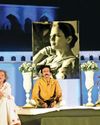As Buddhist monks, in our daily meditation, we think as sentient beings, what we also call mother sentient being.

At the age of 16 you lost your freedom; at 24 you lost your country. You have been living in India for the past 60 years. What was on your mind when you fled Tibet, carrying the hopes of so many people?
As Buddhist monks, in our daily meditation, we think as sentient beings, what we also call mother sentient being. So, my daily prayer is, “So long as space remains, so long as sentient beings remain, I remain in order to serve them.” Acharya Shantideva (one of the great ancient acharyas) said these words. My effort is to make a small contribution towards the wellbeing of the seven billion human beings. By wellbeing, I mean not just at the physical level, but also at the mental level.
You have personally known several Indian leaders, starting with Jawaharlal Nehru. How close have you been to them?
Pandit Nehru was very kind to me; he advised me under difficult circumstances. I followed his advice, and it was very practical. I came to India in 1956, during Buddha Jayanti. At that time, many Tibetan officials told me that I should stay in India and not return. They were fearing the Chinese troops. I discussed with Pandit Nehru, who said that it was better if I returned to Tibet. He carried a copy of the 17-point agreement [of 1951 between the Tibetan government and the Chinese government]. With his own pen he marked a few points and told me [that] on those points [I] could struggle within Tibet. I followed his advice. I had also been carrying out my own investigations through divination. I returned to Tibet in 1957. I tried my best [to maintain peace with the Chinese], but after some time... there [were] uprisings. In 1959, things went out of control and I decided to escape from Tibet.
Why did you choose India?
This story is from the {{IssueName}} edition of {{MagazineName}}.
Start your 7-day Magzter GOLD free trial to access thousands of curated premium stories, and 9,000+ magazines and newspapers.
Already a subscriber ? Sign In
This story is from the {{IssueName}} edition of {{MagazineName}}.
Start your 7-day Magzter GOLD free trial to access thousands of curated premium stories, and 9,000+ magazines and newspapers.
Already a subscriber? Sign In

The female act
The 19th edition of the Qadir Ali Baig Theatre Festival was of the women and by the women

A SHOT OF ARCHER
An excerpt from the prologue of An Eye for an Eye

MASTER OF MAKE-BELIEVE
50 years. after his first book, Jeffrey*Archer refuses to put down his'felt-tip Pilot pen

Smart and sassy Passi
Pop culture works according to its own unpredictable, crazy logic. An unlikely, overnight celebrity has become the talk of India. Everyone, especially on social media, is discussing, dissing, hissing and mimicking just one person—Shalini Passi.

Energy transition and AI are reshaping shipping
PORTS AND ALLIED infrastructure development are at the heart of India's ambitions to become a maritime heavyweight.

MADE FOR EACH OTHER
Trump’s preferred transactional approach to foreign policy meshes well with Modi’s bent towards strategic autonomy

DOOM AND GLOOM
Democrats’ message came across as vague, preachy and hopelessly removed from reality. And voters believed Trump’s depiction of illegal immigrants as a source of their economic woes

WOES TO WOWS
The fundamental reason behind Trump’s success was his ability to convert average Americans’ feelings of grievance into votes for him

POWER HOUSE
Trump International Hotel was the only place outside the White House where Trump ever dined during his four years as president

DON 2.0
Trump returns to presidency stronger than before, but just as unpredictable